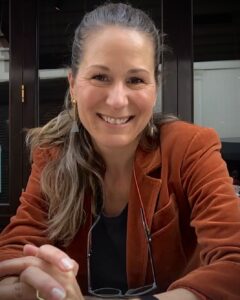Making a difference: The climate change SIG
Background
The Climate Change SIG had its first general meeting on the 23rd of January 2023 having received approval from the Association in the autumn of 2022. This came after an overwhelming response to my heartfelt message on Jiscmail that summer during the heatwave. It clearly demonstrated concern about climate change amongst members and a belief that there needs to be a space within the EMDR community to explore this difficult topic, what it means for us personally and professionally, and how we prepare for how it will inevitably and increasingly find its way into the work that we do going forward.
There has also been an increasing call by members within other professional bodies to recognise and call out the climate crisis as a health emergency and a crisis of social injustice, reflecting a clear wish to use the collective power of our organisations to take a stand and speak out with a unified message, while also progressing work towards increased sustainability within these organisations to move towards a ‘net zero’ future. Many professional bodies have now formed groups and/or made position statements in respect of the climate crisis and sustainability. Even the Health and Care Professions Council (HCPC) has just had a consultation on whether sustainability and climate-change related topics should be written into professional standards of practice. It is time that the EMDR community does the same, especially as our skills in working with trauma will be very much needed as the effects of climate change become more marked.
I did feel somewhat concerned about setting up a climate change SIG, as ‘special interest’ suggests that it is a separate issue, and risks marginalisation rather than recognising the true impact range of climate change on everything that we do. I feel simultaneously my wish to contain the chaos and overwhelm that the topic of climate change fills me with, and how by focusing on a SIG, it places it into a more manageable frame. I have certainly noted how various forms of ‘activism’ I engage in can similarly function to down-regulate my anxiety and distress, by mobilising it into focused action. The lens I have learned to use to understand my own and our collective response to the climate crisis, is of course the one we use with all our clients, a trauma-informed lens, which includes seeing the whole spectrum of immobilisation to mobilisation, and all the nuances in between.
Trying to frame the ‘hyper-object’ of climate change, the SIG proposal laid out three strands, which have now been firmed up into the following areas.
Using our collective power
Connecting with our own association and EMDR associations more widely, as well as other professional bodies and groups within the UK to coordinate messaging around the climate emergency as a mental health and social injustice emergency. Learn and share from what other organisations are doing, identify any parallels which can feed into the EMDR Association’s role and response to the climate emergency, i.e., developing position statements or policies. Support and feed into the Association’s increasing move towards sustainability.
Increasing our awareness
Looking at how we as therapists can prepare ourselves for increases in eco-distress (our own and our clients’) and climate-related issues by doing our own emotional processing, increasing our own knowledge base, increasing our trauma-informed awareness of the psychology of the climate crisis. Establishing ways to look after ourselves in this unfolding crisis, and considering together what our professional duty of care is and how this might translate into how we name climate change in the room with clients. This may also include the SIG developing and running CPD training for the wider Association, or inviting speakers, or running ‘climate cafés.
Working with clients
Sharing experiences of working with eco-distress and climate-change related themes within an EMDR and trauma-informed model. Considering what aspects of EMDR will be particularly important and how they might be adapted; how to disentangle personal trauma from the contextual unfolding climate / biodiversity-loss / social-inequalities related trauma. What aspects of EMDR are most relevant to working with eco-distress.
We have to date had four general meetings and two Committee meetings, and are learning as we go. I’d like to share below some updates on how work in these three areas is developing to give you a flavour, and hopefully to inspire you to take part in whatever way you can. We really do need active involvement of more people.
Action 1: Using our collective power
We have inspired the association to take part in the Climate and Health Scorecard Initiative, which offers guidance and a pathway for health professional bodies to track their move towards increased climate awareness and sustainability. This initiative also then feeds into research collating what bodies are doing and how they are doing it. For more information on this initiative and to get other professional bodies onboard.
We have also formed a working group to try to develop a position statement for the association, that can be integrated as part of the values of the EMDR Association and also inform a future sustainability policy. To aid this work, I have been liaising with some practitioner members of other professional bodies to hear about how they are making changes from the inside out, working with their respective organisations, who are also increasingly seeing the need for clear messaging on climate change and sustainability.
The BABCP, similarly to the EMDR Association, has set up a Climate Change SIG and the British Psychological Society (BPS) have created the Climate and Environmental Action Coordinating Group which recruited members from each division to work towards clearer messaging and action within the BPS as well as connecting with other professional bodies. The BPS also recently held a stimulating Cross-Network Climate Emergency Engagement Event (click here for a recording of the event: ) attended by 120 people, which they plan to collate into a working document. The Association of Clinical Psychologists (ACP) has been very clear for some time now in their messaging on climate change and outspoken in their support of psychologist climate activists, protecting them from being struck off by the HCPC for participating in peaceful non-violent direct action. There is a significant wish from practitioners to connect on this topic and push for change, and a need for a collaborative platform where dialogues can take place more easily. A coalition of psychological professional bodies is emerging where representatives of various bodies can come together for cross-network talks and planning.
We would also like to make more connections within the EMDR community further afield, such as EMDR Europe but also EMDR Australia, as they have been on the front line of climate disasters for some time now and have been working actively with eco trauma. There is much we can learn from one another by beginning to share more actively, and the SIG could be a space where this happens. With this in mind, I have already extended invitations to two Australian trauma therapists to speak to us about their work.
Action 2: Increasing awareness
Our aim is for the SIG to be an inclusive environment that welcomes everyone, no matter where you are on your climate journey. We see the need for us all to increase our overall awareness and understanding of climate change, and a variety of views and input are needed.
One of the concerns therapists voiced early on in our SIG meetings was about accessing information on the science and psychology of the climate crisis. The SIG has tried to be a reference point for information collation and dissemination, signposting to reputable sources of information and training in this field. We have already collated several resources from our own personal journeys and instead of creating a SIG library, we’ve opted to signpost to organisations that are already doing this very well, such as the Climate Psychology Alliance (CPA) UK as well as CPA North America, the Psychology for a Safe Climate (PSC) in Australia, and others. Table 1. contains some key resources if you would like to deepen your involvement in this area.
I also gave a talk at our last SIG general meeting with the focus on a trauma-informed look at the psychology of the climate crisis and considering the role of therapists. This was amended from a talk that I had given to final year psychology post-graduates at City University. So, in addition to providing information, it demonstrated how as therapists we can also inform or teach our peers or others in our workplaces and widen awareness of a trauma-informed understanding of climate change. We are in a very unique position to do this while also teaching people stabilisation skills to better self-regulate.
Another thing that became clear in the first meeting was that many participants have strong emotional reactions about the climate crisis. So, in addition to informing ourselves, there is also the need for each of us to do our own emotional work. We are all in it, and part of preparing ourselves as professionals has to include feeling and processing our own feelings and emotional reactions, so that we can support others with their eco-distress and climate trauma, without either being hijacked by our own reactions or avoiding collusion in the so prevalent socially constructed silence and disavowal.
With this in mind, we have decided to introduce ‘climate café’s as part of what the SIG can offer. Climate cafés are facilitated, safe listening and sharing spaces with the focus on feeling rather than doing. Inspired by ‘death cafés’, this format creates space for connecting to difficult material we may otherwise choose to avoid. Also, by listening to others share, we awaken to our own feelings more fully. More information about climate cafés can be found here.
We have invited two experienced facilitators from the Climate Psychology Alliance, to run a climate café for practitioners at our next SIG meeting on the 18th of September. Booking information will in due course be posted on the Climate Change SIG section of the Forum page of the EMDR Association website.
Action 3: Working with clients
At the first SIG meeting members expressed the wish for a space to discuss client work. Accordingly, we held the second meeting as an open peer supervision space for therapists to bring clients with whom climate-related issues have come up. In this meeting participants reported that currently they are very rarely seeing clients with eco-distress. Nevertheless, we know eco-distress is increasing, especially but not only for younger people, and we need to prepare ourselves for this.
With this in mind, we have invited a member of EMDR Association Australia to speak about her work and how her service has adapted EMDR protocols for working with climate-related trauma and eco-distress. Therapists in Australia have a lot to teach us from having been on the front line for some time now, grappling with questions that we are only starting to ask here, such as ‘should I bring climate change into the therapy session, if yes then how, or when?’
As our skills and experience increase, the SIG may be able to develop protocols or variations on existing protocols for working with climate-related trauma and eco-distress.
We would also like to think that the SIG can offer something to the wider EMDR community in the form of CPD events. Certainly actions 2 and 3 would lend themselves to this and whether we develop a training within the SIG to offer out, or invite speakers, I hope that it can draw more interest from within the EMDR community. To take the three action areas forward though, we need more engagement. If you would like to receive updates about the SIG, please fill out a membership form so I can email you directly. Additionally, we will try to keep information updated on the EMDR Forum, where the Climate SIG has its own page. We look forward to hearing from you.




